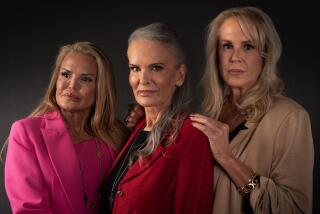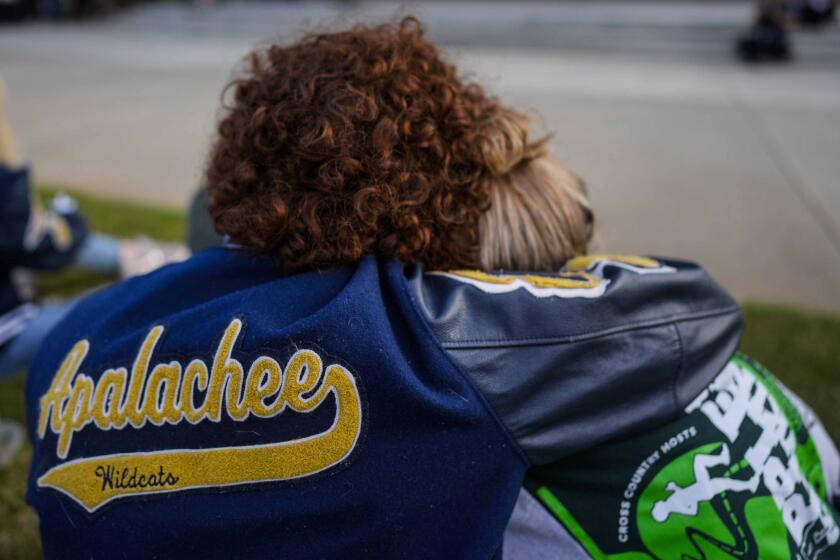A House Divided in Its Pursuit of Equality
Today, I wade reluctantly into a fast-flowing stream of rhetorical muck, one of many generated by the cosmological phenomenon known as the O.J. Simpson murder trial.
Names are being called, apologies are being demanded, dirty linen is being aired and somewhere, undoubtedly, hands are being rubbed in delight.
On one side: The National Organization for Women, whose president, Patricia Ireland, recently called an extraordinary news conference to denounce one of NOW’s own and demand an apology for what Ireland described as “racially insensitive statements.”
On the other side: Tammy Bruce, president of Los Angeles NOW, who claims that her remarks have been misinterpreted or misconstrued and that “if anyone owes an apology, it should be Patricia, to the women who die every single day at the hands of male intimates, while [she] is spending thousands of dollars . . . time and energy attacking me.”
The women’s movement of the last two decades has always struggled against a perception that it is the province of the white professionals. As NOW and other feminist organizations gear up to fight for affirmative action, the timing of this conflict is especially sad.
Bruce has been taken to task by NOW for failing to acknowledge that for many people, racial animosity was as important a factor in the trial as wife battering.
In a long interview the other day, Bruce--a former publicist who is adept at playing the press--said that she feels she is being victimized because she has received so much media attention and that she may be perceived as a threat to NOW leadership because of her high visibility.
She also claimed the national organization did not alert her that she was facing possible censure at its board meeting in New Orleans two weeks ago. She said that she was not invited to attend and that “we were not given notice that we were on the agenda. . . . It breaks my heart, I can’t even begin to tell you.”
An officer for the national group was flabbergasted to hear that.
“I am very sorry to hear her say those things,” said Kim Gandy, national NOW’s executive vice president, in a pained voice. (Ireland was vacationing abroad.) “I personally told her that it was going to be a topic of discussion. I urged her to come. She said, ‘I may come.’ I said, ‘You need to come.’ ”
The board did indeed censure Bruce, which Gandy said is one of the mildest forms of rebuke allowable under Robert’s Rules of Order. The action was taken, Gandy said, in response to complaints by NOW members and leaders who have bristled at Bruce’s impassioned efforts to keep domestic abuse, at all costs, on a front burner.
Where this is all headed, no one knows.
NOW has made its demands; Bruce has dug in her heels, accusing NOW leaders of a “deafening silence on the issue of domestic violence in the aftermath of the Simpson verdict.”
“For her to say she is the only one doing anything on domestic violence is insulting,” said Gandy, who cites NOW’s work on the Violence Against Women Act and the many interviews following the Simpson verdict in which NOW leaders emphasized the importance of continuing the fight against domestic violence.
It’s admirable how Bruce has stubbornly managed to keep the spotlight on domestic violence and its victims, and how she has directed frustration with the Simpson verdicts into peaceful demonstrations and vigils. Yet there’s something odd about her inability to acknowledge that, for some people, the trial and its revelations about the LAPD were a profound and deeply disturbing lesson on racism.
A day after the verdicts, Bruce told a town meeting hosted by Ted Koppel that “what we need to teach our children is not about racism but about violence against women.” She may have been trying desperately to return the focus to her issue, but in doing so, she appeared to minimize racism.
In front of NBC studios, where Simpson was scheduled to be interviewed by Tom Brokaw and Katie Couric, Bruce announced to Simpson that “you not welcome in this country, you are not welcome on our airwaves, you are not welcome in our culture.” She was referring to his history of wife battering, but many were offended by her statement. I thought it was pompous, but not racially insensitive. It was also incorrect, as millions of people were anxious to hear what Simpson would say.
When Bruce told a colleague of mine who profiled her in October that her focus on domestic violence during the trial provided a “needed break from all that talk of racism,” I know my reaction was: A what?
We don’t--and can’t--talk about racism enough, especially in this town, in this time.
“If she said these things, and she didn’t mean to say them, or said them in the heat of an argument, I don’t understand why she won’t just say that,” Gandy said.
But Bruce is adamant.
“I have no intention of doing a Nixon ‘I am not a crook’ because some losers out here have decided that name-calling is the best strategy to use against someone whom they are desperately jealous of,” wrote Bruce in an letter to NOW officers in Washington, D.C., on the eve of the meeting in which she was censured.
Bruce said she will not “move through a false dichotomy, pitting race against domestic violence,” but it would seem to be Tammy Bruce herself who has created the dichotomy.
This is the heart of criticism directed at her by NOW leaders, who have toiled for years to overcome the perception that the movement excludes women of color.
The women’s movement needs people with the passion and skill of Tammy Bruce. And Tammy Bruce needs to realize that sometimes, other people are right too.
* Robin Abcarian’s column appears Wednesdays and Sundays. Readers may write to her at the Los Angeles Times, Life & Style, Times Mirror Square, Los Angeles, CA 90053. Send e-mail to HBZK23A@prodigy.com.
More to Read
Sign up for Essential California
The most important California stories and recommendations in your inbox every morning.
You may occasionally receive promotional content from the Los Angeles Times.











